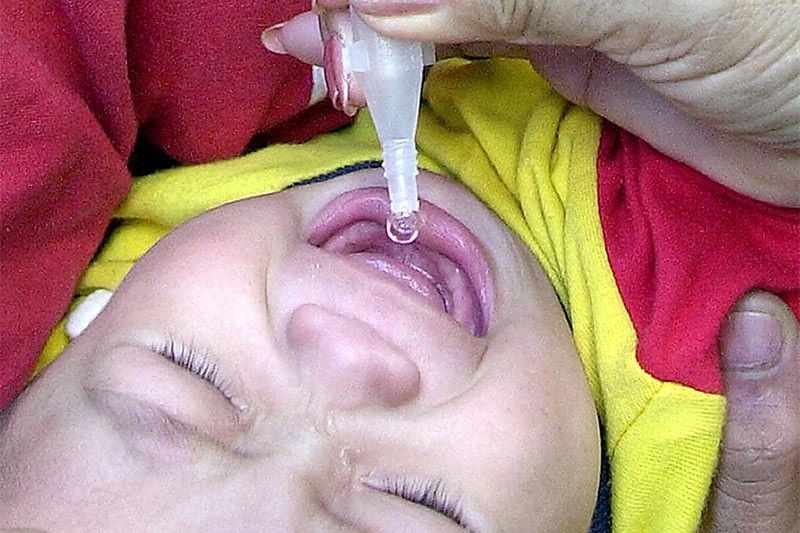Polio's resurgence in Philippines: The ancient disease was supposed to be extinct last year

MANILA, Philippines — Experts had hoped that polio would be a distant memory by now with the disfiguring and potentially deadly disease only to be seen in the pages of history books or depicted in stone carvings of ancient Egyptians.
Since 1988 when the Global Polio Eradication Initiative was launched, a public-private partnership led by national governments, the World Health Organization, Rotary International, the US Centers for Disease Control and Prevention, UNICEF and the Bill & Melinda Gates Foundation, giant strides were achieved to stamp out the debilitating disease through an ambitious mass vaccination campaign.
When the initiative was formed, over 350,000 people a year were paralyzed by polio. This number dramatically went down 99.9% to 33 in 2018, according to WHO. Polio-endemic countries also considerably dwindled in numbers from 125 to only three today — Pakistan, Afghanistan and Nigeria.
The initiative was making breakthroughs in wiping out the disease but then cases stopped declining.
Resurfacing after 19 years
Polio has managed to reemerge in countries where it was once declared eradicated like Congo, Ukraine, Syria, Papua New Guinea, Indonesia, Laos, Myanmar and most recently the Philippines.
It was supposed to be wiped off the face of the earth by 2018, after an earlier deadline of 2000 set by the initiative was pushed back, but a year later the highly contagious disease remains unshakeable. Now, the initiative hopes to rid the world of this disease by 2023.
Philippine health authorities said a three-year-old girl from Lanao del Sur had contracted the paralyzing disease, the country’s first case since it gained polio-free status in 2000, while the virus was also detected in Manila's sewage and in waterways of Davao.
Polio strains detected in Lanao del Sur, Manila and Davao are all of the vaccine-derived variety. This strain has genetically mutated from a weakened wild poliovirus type 2 contained in the oral vaccine used all over the world to control the disease.
"The outbreak calls for urgent action to protect more children from being infected. It reminds us of the importance of increasing immunization coverage to 95% of children to stop poliovirus transmission in the Philippines," said Oyun Dendevnorov, UNICEF Philippines representative.
Polio has no cure but immunization can protect from both vaccine-derived or wild forms of the virus that mainly affects children under five years of age.
WHO said children in all countries are at risk of contracting the disease as long as a single child remains infected with poliovirus.
"The poliovirus can easily be imported into a polio-free country and can spread rapidly amongst unimmunized populations. Failure to eradicate polio could result in as many as 200,000 new cases every year, within 10 years, all over the world," it said.
In the Philippines, immunization for tuberculosis; diphtheria, tetanus and pertussis; polio; measles; mumps; German measles; Hepatitis-B; and H. Influenza Type B are mandatory and free at any government hospital or health center to infants and children up to five years of age, according to Republic Act 10152 or the Mandatory Basic Immunization Act.
Global mistrust
News on the polio epidemic in the Philippines comes after measles and dengue outbreaks hit the country earlier this year, killing over a thousand people, as public trust in vaccines broke down over controversy on the Dengvaxia vaccine.
In 2016, the Philippines became the first to use the vaccine in a country trial program involving hundreds of thousands of schoolchildren. A year later, a disclosure by the vaccine's French manufacturer Sanofi that it could worsen symptoms for people not previously infected with the virus sparked nationwide panic with some parents blaming Dengvaxia for their child’s death.
READ: How the Dengvaxia scare helped erode decades of public trust in vaccines
In countries where polio is still endemic, the deteriorating security situation is the biggest reason why the disease has gotten a foothold, a WHO review showed. The increasing mistrust of vaccination is also cited as an issue.
In Afghanistan, there have been accusations that the polio program serves as a “Trojan Horse” to spy on behalf of Afghan and North Alliance Treaty Organization forces. In Pakistan, meanwhile, rumors persist that the vaccine would reduce the size of a child’s heart to that of a rat, while others claimed that it provoked premature sexual activity and other misbehavior.
How it all started
A July report of WHO and UNICEF said vaccination rates have “dangerously” stalled with 19.8 million children under the age of one failing to get the basic triple "DPT" vaccine against tetanus, diphtheria and whooping cough, or were not protected against measles.
Two-thirds of these unvaccinated children live in 10 countries: Angola, Brazil, Ethiopia, India, Indonesia, Nigeria, Pakistan, the Philippines, Democratic Republic of Congo and Vietnam.
Globally, two to three million deaths every year are prevented due to immunization. A lot of "anti-vaxers," however, continue to oppose vaccination citing an already debunked 1998 study published by medical journal The Lancet which reported a causal link between vaccines and autism in children.
The study was withdrawn and its author Andrew Wakefield barred from the profession when it was revealed that evidence underlying the claim had been falsified. The devastating effects of its misinformation, however, lingers. — with AFP
- Latest
- Trending


























